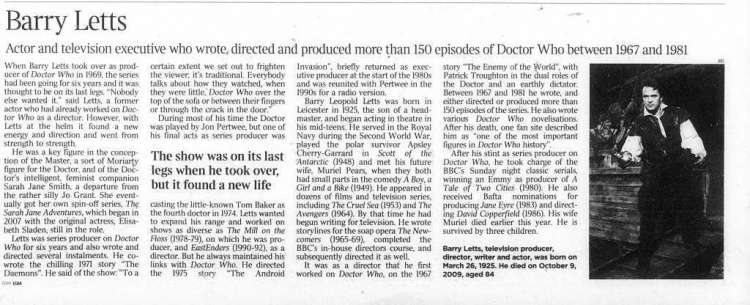Difference between revisions of "Barry Letts (The Times)"
John Lavalie (talk | contribs) (Created page with "{{obit|Barry Letts}}{{article | publication = The Times | file = 2009-10-26 Times.jpg | px = 450 | height = | width = | date = 2009-10-26 | author = | pages = 56 | language...") |
John Lavalie (talk | contribs) |
||
| Line 2: | Line 2: | ||
| publication = The Times | | publication = The Times | ||
| file = 2009-10-26 Times.jpg | | file = 2009-10-26 Times.jpg | ||
| − | | px = | + | | px = 750 |
| height = | | height = | ||
| width = | | width = | ||
Latest revision as of 23:05, 23 October 2014
- Publication: The Times
- Date: 2009-10-26
- Author:
- Page: 56
- Language: English
Actor and television executive who wrote, directed and produced more than 150 episodes of Doctor Who between 1967 and 1981
When Barry Letts took over as producer of Doctor Who in 1969, the series had been going for six years and it was thought to be on its last legs. "Nobody else wanted it," said Letts, a former actor who had already worked on Doctor Who as a director. However, with Letts at the helm it found a new energy and direction and went from strength to strength.
He was a key figure in the conception of the Master, a sort of Moriarty figure for the Doctor, and of the Doctor's intelligent, feminist companion Sarah Jane Smith, a departure from the rather silly Jo Grant. She eventually got her own spin-off series, The Sarah Jane Adventures, which began in 2007 with the original actress, Elisabeth Sladen, still in the role.
Letts was series producer on Doctor Who for six years and also wrote and directed several instalments. He cowrote the chilling 1971 story "The Daemons". He said of the show: "To a certain extent we set out to frighten the viewer; it's traditional. Everybody talks about how they watched, when they were little, Doctor Who over the top of the sofa or between their fingers or through the crack in the door."
During most of his time the Doctor was played by Jon Pertwee, but one of his final acts as series producer was casting the little-known Tom Baker as the fourth doctor in 1974. Letts wanted to expand his range and worked on shows as diverse as The Mill on the Floss (1978-79), on which he was producer, and EastEnders (1990-92), as a director. But he always maintained his links with Doctor Who. He directed the 1975 story "The Android Invasion", briefly returned as executive producer at the start of the 1980s and was reunited with Pertwee in the 1990s for a radio version.
Barry Leopold Letts was born in Leicester in 1925, the son of a headmaster, and began acting in theatre in his mid-teens. He served in the Royal Navy during the Second World War, played the polar survivor Apsley Cherry-Garrard in Scott of the Antarctic (1948) and met his future wife, Muriel Pears, when they both had small parts in the comedy A Boy, a Girl and a Bike (1949). He appeared in dozens of films and television series, including The Cruel Sea (1953) and The Avengers (1964). By that time he had begun writing for television. He wrote storylines for the soap opera The Newcomers (1965-69), completed the BBC's in-house directors course, and subsequently directed it as well.
It was as a director that he first worked on Doctor Who, on the 1967 story "The Enemy of the World", with Patrick Troughton in the dual roles of the Doctor and an earthly dictator. Between 1967 and 1981 he wrote, and either directed or produced more than 150 episodes of the series. He also wrote various Doctor Who novelisations. After his death, one fan site described him as "one of the most important figures in Doctor Who history".
After his stint as series producer on Doctor Who, he took charge of the BBC's Sunday night classic serials, winning an Emmy as producer of A Tale of Two Cities (1980). He also received Bafta nominations for producing Jane Eyre (1983) and directing David Copperfield (1986). His wife Muriel died earlier this year. He is survived by three children.
Barry Letts, television producer, director, writer and actor, was born on March 26, 1925. He died on October 9, 2009, aged 84
The show was on its last legs when he took over, but it found a new life
Disclaimer: These citations are created on-the-fly using primitive parsing techniques. You should double-check all citations. Send feedback to whovian@cuttingsarchive.org
- APA 6th ed.: (2009-10-26). Barry Letts (The Times). The Times p. 56.
- MLA 7th ed.: "Barry Letts (The Times)." The Times [add city] 2009-10-26, 56. Print.
- Chicago 15th ed.: "Barry Letts (The Times)." The Times, edition, sec., 2009-10-26
- Turabian: "Barry Letts (The Times)." The Times, 2009-10-26, section, 56 edition.
- Wikipedia (this article): <ref>{{cite news| title=Barry Letts (The Times) | url=http://cuttingsarchive.org/index.php/Barry_Letts_(The_Times) | work=The Times | pages=56 | date=2009-10-26 | via=Doctor Who Cuttings Archive | accessdate=8 February 2026 }}</ref>
- Wikipedia (this page): <ref>{{cite web | title=Barry Letts (The Times) | url=http://cuttingsarchive.org/index.php/Barry_Letts_(The_Times) | work=Doctor Who Cuttings Archive | accessdate=8 February 2026}}</ref>
